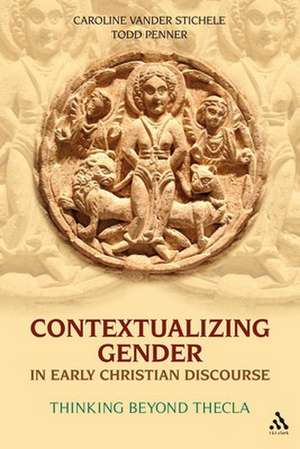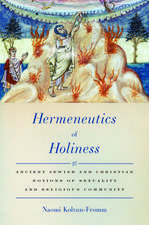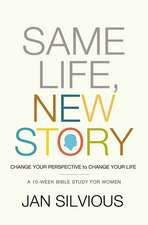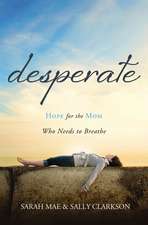Contextualizing Gender in Early Christian Discourse: Thinking Beyond Thecla
Autor Caroline Vander Stichele, Todd Penneren Limba Engleză Paperback – 29 iun 2009
| Toate formatele și edițiile | Preț | Express |
|---|---|---|
| Paperback (1) | 218.91 lei 6-8 săpt. | |
| Bloomsbury Publishing – 29 iun 2009 | 218.91 lei 6-8 săpt. | |
| Hardback (1) | 891.10 lei 6-8 săpt. | |
| Bloomsbury Publishing – 29 iun 2009 | 891.10 lei 6-8 săpt. |
Preț: 218.91 lei
Preț vechi: 245.41 lei
-11% Nou
Puncte Express: 328
Preț estimativ în valută:
41.89€ • 45.49$ • 35.19£
41.89€ • 45.49$ • 35.19£
Carte tipărită la comandă
Livrare economică 23 aprilie-07 mai
Preluare comenzi: 021 569.72.76
Specificații
ISBN-13: 9780567030368
ISBN-10: 0567030369
Pagini: 264
Dimensiuni: 156 x 234 x 20 mm
Greutate: 0.41 kg
Editura: Bloomsbury Publishing
Colecția T&T Clark
Locul publicării:London, United Kingdom
ISBN-10: 0567030369
Pagini: 264
Dimensiuni: 156 x 234 x 20 mm
Greutate: 0.41 kg
Editura: Bloomsbury Publishing
Colecția T&T Clark
Locul publicării:London, United Kingdom
Caracteristici
Outlines a methodology for gender-critical analysis and demonstrates how to apply it.
Cuprins
ACKNOWLEDGEMENTS
INTERSEXIONS
Bibliography
CHAPTER 1: INTRODUCING A GENDER-CRITICAL APPROACH
Discourse and the Social Production of Knowledge
Sex, Gender, and Politics
Colonial Contexts and Gender
History and Discourse
Concluding Contextual Observations
Bibliography
Notes
CHAPTER 2: CONTEXTUALIZING GENDER IN THE GRECO-ROMAN WORLD
Discourse and the Meaning of Sex
Models for Understanding Sex
From the Politics of the Body to the Body Politic
Physiognomy as Politics of the Body
Gendering Bodies
The Body Politic
Bodies in Empire
Bibliography
Notes
CHAPTER 3: BOUNDARIES AND BODIES IN EARLY CHRISTIAN DISCOURSE
Canonical and Conceptual Boundaries
Cultural Boundaries
Political Boundaries
Social Boundaries
Conclusion
Bibliography
Notes
CHAPTER 4: GENDER AND THE MODERN INTERPRETER
Race, Gender, and the Formation of Modern Biblical Scholarship
The Racializing of Modern Biblical Scholarship
The Gendering of Modern Biblical Scholarship
Gender and Power in the Discipline of Biblical Studies
Conclusion
Bibliography
Notes
CHAPTER 5: READING (FOR) GENDER
Gender-Critical Reading Assumptions and Strategies
Reading (for) Gender and the Worlds of the Text
The World behind the Text
The World in the Text
The World in front of the Text
Summary
Three Examples of Reading (for) Gender
1 Corinthians 11:2-16
Acts 18:1-18
Acts of Paul and Thecla
Conclusion
Bibliography
Notes
(DIS)CLOSURE
Bibliography
INDEX
INTERSEXIONS
Bibliography
CHAPTER 1: INTRODUCING A GENDER-CRITICAL APPROACH
Discourse and the Social Production of Knowledge
Sex, Gender, and Politics
Colonial Contexts and Gender
History and Discourse
Concluding Contextual Observations
Bibliography
Notes
CHAPTER 2: CONTEXTUALIZING GENDER IN THE GRECO-ROMAN WORLD
Discourse and the Meaning of Sex
Models for Understanding Sex
From the Politics of the Body to the Body Politic
Physiognomy as Politics of the Body
Gendering Bodies
The Body Politic
Bodies in Empire
Bibliography
Notes
CHAPTER 3: BOUNDARIES AND BODIES IN EARLY CHRISTIAN DISCOURSE
Canonical and Conceptual Boundaries
Cultural Boundaries
Political Boundaries
Social Boundaries
Conclusion
Bibliography
Notes
CHAPTER 4: GENDER AND THE MODERN INTERPRETER
Race, Gender, and the Formation of Modern Biblical Scholarship
The Racializing of Modern Biblical Scholarship
The Gendering of Modern Biblical Scholarship
Gender and Power in the Discipline of Biblical Studies
Conclusion
Bibliography
Notes
CHAPTER 5: READING (FOR) GENDER
Gender-Critical Reading Assumptions and Strategies
Reading (for) Gender and the Worlds of the Text
The World behind the Text
The World in the Text
The World in front of the Text
Summary
Three Examples of Reading (for) Gender
1 Corinthians 11:2-16
Acts 18:1-18
Acts of Paul and Thecla
Conclusion
Bibliography
Notes
(DIS)CLOSURE
Bibliography
INDEX
Recenzii
'Caroline Vander Stichele and Todd Penner are arguably the most creative and learned intellectual partnership in contemporary New Testament and Christian origins scholarship. Both are rightly known for their wide-ranging knowledge of critical theory, Christian origins scholarship and ancient sources. Contextualizing Gender in Early Christian Discourse is a predictably impressive addition to their published work but this time with a more introductory focus. In addition to functioning as a first-class introductory text, this book moves beyond standard introductions to the New Testament and Christian origins in that it offers readers valuable summaries of prominent thinkers (e.g. Foucault, Butler, Said, Bhabha), interwoven with their influence and potential applications in the study of the New Testament and Christian origins. There is a common and not unfair complaint that works grounded in contemporary critical theory can have a tendency to be near-impossible to understand for those outside the discourse. These authors, however, could not legitimately be accused of such a thing. Their book is clearly written, neatly laid out and full of valuable and creative examples from sources ancient and modern, both famous and not-so-famous. Not only does Contextualizing Gender in Early Christian Discourse deserve to be on the bibliography for New Testament and/or Christian origins courses, it would make a perfect entry point for more experienced scholars unfamiliar or out-of-touch with contemporary ideological criticism and critical theory. As the book contains plenty of original insights, seasoned ideological critics will also discover a thing or two. While we could all learn from the chapters in this book, the chapter on 'Gender and the Modern Interpreter' really ought to be read by all scholars in the guild, no matter what their favoured approaches may be, because it constitutes an accurate, incisive, morally-charged, and potentially revolutionary critique of the academic discipline of biblical studies.' - James Crossley, Department of Biblical Studies, University of Sheffield, UK
'In this very accessible, well-written and engaging book, the authors address early Christianity as discourse and locate gender as a core dynamic in that discourse by drawing on an impressive range of feminist theory. The book is a highly successful attempt to conceptualise Early Christian studies as part of a broader Humanities curriculum. They see as the vital issue of our time to reestablish critical-thinking engagement in our classrooms and institutions, and they contribute massively towards that goal.' - Jorunn Økland, Centre for Gender Research, University of Oslo, Norway.
'As two of the more accomplished and compelling editors, organizers, collaborators and thinkers (in their own right), Caroline Vander Stichele and Todd Penner have done it again. In getting us to "think beyond Thecla," their intersectional and boundary-crossing approach moves beyond biblical studies to grapple with some of the more important figures in the humanities (including Foucault, Butler, and Said among many others). Like so many manifestations and constructions of gender, their argument is complicated, yet accessible and insistently relevant. Such matters are important to learn and think about-something I aspire to do with students and colleagues alike... with, through, and beyond this book!' - Joseph Marchal, Department of Philosophy and Religious Studies, Ball State University, Muncie, IN, USA
'Navigating the intersections of biblical, ancient, and gender studies can often put the student of early Christian literature in a space reminiscent of a circus hall of mirrors. In this short and stunning book, Caroline Vander Stichele and Todd Penner offer rare theoretical and methodological clarity and transparency, as well as substantial resources for renegotiating, and reconfiguring, such difficult terrain without relying on easy assumptions about ancient or modern texts, contexts, and histories of interpretation. Contextualizing Gender in Early Christian Discourse is not only an eagerly anticipated contribution to professional gender-critical conversations in the field-it is also an eminently teachable book that engages students and teachers about shared material, and our shared enterprise, as learners and scholars in the world today. Incisive and accessible, concerned with the past and forward-thinking, collaboratively written, politically transparent: this book represents a powerful dedication to imagining what can be possible, and invites readers to similarly commit to such imagination.' - Davina C. Lopez, Eckerd College, St. Petersburg, FL, USA
"This gender-critical approach introduced in this volume seeks to situate the NT and early Christian writings in the broader context of ancient literary and religious traditions, to focus on discourse as a constituent aspect of identity formation, to foster an appreciation for gender issues, to continue to value a historical approach, to stress the role of ideology in the formation of the worlds of the text as well as ancient and modern readers, and to highlight the colonizing nature of empire. After a ten-page introduction, it introduces a gender-critical approach, contextualizes gender in the Greco-Roman world, discusses boundaries and bodies in early Christian discourse, reflects on gender and the modern interpreter, and considers reading (for) gender. Vander Stichele, university docent in religious studies at the University of Amsterdam, and Penner, professor of religious studies at Austin College in Sherman, TX, conclude that thinking beyond Thecla entails giving serious consideration to the structures and mechanisms of boundary-crossing, which is one of the critical components of their gender-critical approach." -New Testament Abstracts, Vol. 54
This book is highly recommended for students, but will also be of interest to more established scholars seeking to apply ideology-critical approaches to ancient texts.
'Students of all ages and occupations will benefit form Vander Stichele and Penner's clear, concise prose and their frequent summaries and reviews of important, current scholarship...Those who desire a greater understanding of the gender-critical approach and who appreciate Foucault's thought will find this book a useful tool with which to explore early Christian discourses and our own world.' -Interpretation: A Journal of Bible and Theology
'Contextualising Gender in Early Christian Discourse is a comprehensive survey of early Christian discourse of gender in scripture. The book draws on a remarkable range of feminist theory, briefly considering the history of the New Testament interpretation, its role in the Christian canon, and its major theologies related to a gender-critical approach. The purpose of Contextualising Gender is to analyze different aspects of the representation of gender, sex, and sexuality in early Christian texts, with attention to their historical and contemporary significance.' - Igal German, Wycliffe College (Toronto School of Theology), Cananda
'In this very accessible, well-written and engaging book, the authors address early Christianity as discourse and locate gender as a core dynamic in that discourse by drawing on an impressive range of feminist theory. The book is a highly successful attempt to conceptualise Early Christian studies as part of a broader Humanities curriculum. They see as the vital issue of our time to reestablish critical-thinking engagement in our classrooms and institutions, and they contribute massively towards that goal.' - Jorunn Økland, Centre for Gender Research, University of Oslo, Norway.
'As two of the more accomplished and compelling editors, organizers, collaborators and thinkers (in their own right), Caroline Vander Stichele and Todd Penner have done it again. In getting us to "think beyond Thecla," their intersectional and boundary-crossing approach moves beyond biblical studies to grapple with some of the more important figures in the humanities (including Foucault, Butler, and Said among many others). Like so many manifestations and constructions of gender, their argument is complicated, yet accessible and insistently relevant. Such matters are important to learn and think about-something I aspire to do with students and colleagues alike... with, through, and beyond this book!' - Joseph Marchal, Department of Philosophy and Religious Studies, Ball State University, Muncie, IN, USA
'Navigating the intersections of biblical, ancient, and gender studies can often put the student of early Christian literature in a space reminiscent of a circus hall of mirrors. In this short and stunning book, Caroline Vander Stichele and Todd Penner offer rare theoretical and methodological clarity and transparency, as well as substantial resources for renegotiating, and reconfiguring, such difficult terrain without relying on easy assumptions about ancient or modern texts, contexts, and histories of interpretation. Contextualizing Gender in Early Christian Discourse is not only an eagerly anticipated contribution to professional gender-critical conversations in the field-it is also an eminently teachable book that engages students and teachers about shared material, and our shared enterprise, as learners and scholars in the world today. Incisive and accessible, concerned with the past and forward-thinking, collaboratively written, politically transparent: this book represents a powerful dedication to imagining what can be possible, and invites readers to similarly commit to such imagination.' - Davina C. Lopez, Eckerd College, St. Petersburg, FL, USA
"This gender-critical approach introduced in this volume seeks to situate the NT and early Christian writings in the broader context of ancient literary and religious traditions, to focus on discourse as a constituent aspect of identity formation, to foster an appreciation for gender issues, to continue to value a historical approach, to stress the role of ideology in the formation of the worlds of the text as well as ancient and modern readers, and to highlight the colonizing nature of empire. After a ten-page introduction, it introduces a gender-critical approach, contextualizes gender in the Greco-Roman world, discusses boundaries and bodies in early Christian discourse, reflects on gender and the modern interpreter, and considers reading (for) gender. Vander Stichele, university docent in religious studies at the University of Amsterdam, and Penner, professor of religious studies at Austin College in Sherman, TX, conclude that thinking beyond Thecla entails giving serious consideration to the structures and mechanisms of boundary-crossing, which is one of the critical components of their gender-critical approach." -New Testament Abstracts, Vol. 54
This book is highly recommended for students, but will also be of interest to more established scholars seeking to apply ideology-critical approaches to ancient texts.
'Students of all ages and occupations will benefit form Vander Stichele and Penner's clear, concise prose and their frequent summaries and reviews of important, current scholarship...Those who desire a greater understanding of the gender-critical approach and who appreciate Foucault's thought will find this book a useful tool with which to explore early Christian discourses and our own world.' -Interpretation: A Journal of Bible and Theology
'Contextualising Gender in Early Christian Discourse is a comprehensive survey of early Christian discourse of gender in scripture. The book draws on a remarkable range of feminist theory, briefly considering the history of the New Testament interpretation, its role in the Christian canon, and its major theologies related to a gender-critical approach. The purpose of Contextualising Gender is to analyze different aspects of the representation of gender, sex, and sexuality in early Christian texts, with attention to their historical and contemporary significance.' - Igal German, Wycliffe College (Toronto School of Theology), Cananda













